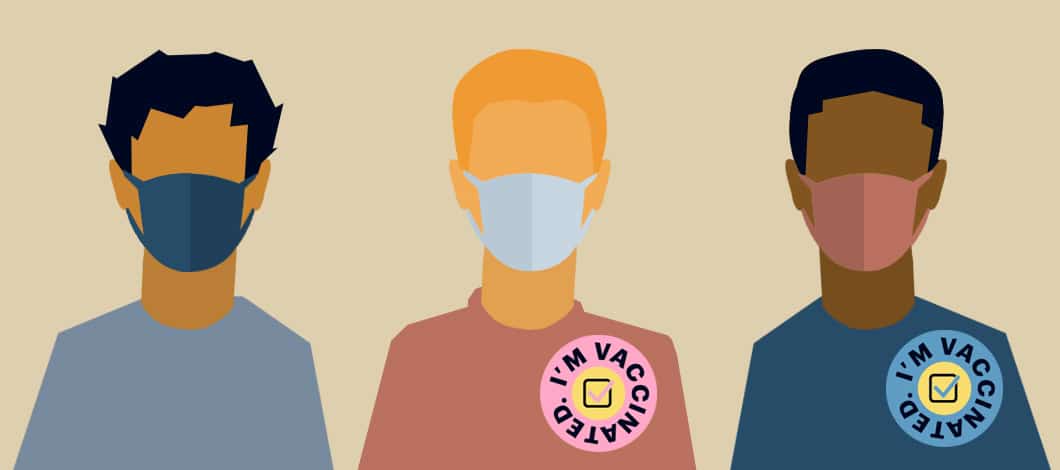It’s on the minds of business owners great and small: Can employers require a COVID vaccine for their workers?
Generally speaking, vaccines approved by the Food and Drug Administration (FDA) may be required, but it’s unclear for FDA-authorized emergency vaccines.
Legal scholars are divided on emergency vaccines in the absence of court rulings, but with some employers going ahead, federal agencies have issued guidelines for legal compliance when administering vaccination policies.
Let’s take a look at some of the top legal issues employers need to consider. We’ll review some of the most important laws and regulations that govern whether businesses can require mandatory vaccines and how employers should handle vaccination policies.
Can an Employer Require a COVID Vaccine? Key Issues
The question of mandatory vaccination policies in the workplace touches on a number of laws and regulations administered by the FDA, the Equal Employment Opportunity Commission (EEOC), the Labor Department and the Department of Health and Human Services (HHS), as well as state regulatory bodies.
These include whether or how:
- FDA regulations allow organizations to mandate vaccines that have only been authorized for emergency use
- EEOC antidiscrimination policies affect the hiring and management of unvaccinated employees
- The Fair Labor Standards Act (FLSA) and state laws apply to compensating employees for mandatory vaccinations
- The Health Insurance Portability and Accountability Act (HIPAA) applies to protecting employee vaccination information
Each of these issues has a bearing on employer decisions about mandatory vaccination policies. These issues can be complex, so we recommend that employers direct questions to a qualified attorney and to representatives of relevant government agencies. Note that the laws and regulations governing this situation are fluid and subject to change.

FDA Regulatory Policies on Emergency Use Authorization
The FDA normally follows a standard development and approval process for evaluating whether new medical products work correctly and whether their health benefits outweigh their known risks. When following standard procedures, the process of developing a vaccine often takes 15 to 20 years, according to the College of Physicians of Philadelphia, the oldest medical society in the U.S.
Recognizing that a public health crisis may require a more rapid response than the normal vaccine development and approval process allows, the Federal Food, Drug and Cosmetic Act (FD&C Act) allows that in declared emergency situations, the FDA can grant an Emergency Use Authorization (EUA) for medical products which haven’t yet been approved. On March 27, 2020, the Secretary of the HHS, which governs the FDA, issued an EUA declaration authorizing the use of unapproved medical products during the pandemic.
As of late April 2021, the FDA has authorized the use of 3 unapproved vaccines manufactured by Pfizer-BioNTech, Moderna and Johnson & Johnson subsidiary Janssen. Clinical trials of these vaccines under standard FDA procedures will continue for years. For example, in the case of Moderna, the third phase of clinical trials schedules 24 months of follow-up observation following vaccination.
Can Employers Require Employees to Be Vaccinated Under an EUA?
This has raised the legal question of whether employers can require employees to take vaccinations that are only authorized under a EUA declaration.
FDA Guidance on Emergency Vaccines
The section of the FD&C Act governing EUAs lists several conditions for authorizing use of an unapproved product. One of the conditions is described in the following language: “Appropriate conditions designed to ensure that individuals to whom the product is administered are informed … of the option to accept or refuse administration of the product, of the consequences, if any, of refusing administration of the product, and of the alternatives to the product that are available and of their benefits and risks.”
The FDA’s guidance to industry about EUAs during the pandemic echoes this language, stating, “For an unapproved product … the statute requires that FDA ensure that recipients are informed to the extent practicable given the applicable circumstances … that they have the option to accept or refuse the EUA product.”
While discussing this during a meeting of the Centers for Disease Control and Prevention (CDC), CDC official Dr. Amanda Cohn stated, “under an EUA, vaccines are not allowed to be mandatory. Therefore, early in the vaccination phase individuals will have to be consented and cannot be mandated to be vaccinated.”
In another discussion during an FDA meeting, Cohn specified that this applies to private organizations, stating, “Organizations, such as hospitals, with licensed products do have capability of asking their workers to get the vaccine. But in the setting of an EUA, patients and individuals will have the right to refuse the vaccine.”
Nonbinding Federal Guidance Leaves Room for State Laws
However, the FDA’s guidance to industry on EUAs is prefaced by the disclaimer that it “contains nonbinding recommendations,” which has led some legal experts to argue for a loophole exempting employers from restrictions on vaccine mandates. The CDC’s website states while the FDA doesn’t mandate COVID-19 vaccinations, “whether a state, local government, or employer … may require or mandate COVID-19 vaccination is a matter of state or other applicable law.”
Legally, this issue remains in limbo. As yet, the courts haven’t ruled on whether a COVID-19 vaccination can be mandated under an EUA, according to a study published in April 2021 by the Kaiser Family Foundation, a nonprofit provider of information on national health issues. Employers considering mandatory vaccination policies should be aware of this uncertainty and proceed cautiously in consultation with a qualified legal adviser.

Can Vaccines Be Mandatory? How EEOC Policies Apply
The CDC’s guidance on workplace vaccination programs notes that some employees may be exempt because of medical conditions which place them at risk of adverse reaction or because of religious beliefs. This guidance is rooted in EEOC regulations, which prohibit discrimination against employees because of disabilities or religious beliefs.
The EEOC provides guidance on what employers should do if an employee objects to vaccination because of a disability or religious belief. In general, the employer should seek a reasonable accommodation for the employee unless it would impose an undue burden on the employer, such as incurring a demonstrable workplace safety threat.
-
For Example
The employer might allow the employee to work remotely or in a socially distanced workspace to reduce risk to other workers.
If no reasonable accommodation is available, the employer may exclude the employee from the workplace, but can’t necessarily terminate them without consulting other applicable laws and contractual agreements.
Employers must be cautious to avoid infringing on antidiscrimination laws when asking employees if they’ve been vaccinated. If any employee indicates they haven’t been vaccinated, asking the employee why they haven’t been vaccinated risks leading to discussions about the employee’s medical condition or religious beliefs, setting the stage for discrimination claims, cautions Morgan Lewis attorney Dan Kadish in an interview with the Washington Post.
This also applies during the recruitment process when it comes to asking candidates if they’ve been vaccinated. Kadish and other legal experts advise that questions about vaccinations directed at employees and recruits should be limited to whether the individual has been vaccinated and shouldn’t probe for additional information unless this information is necessary for the job. Moreover, questions about vaccinations must be applied evenly to all employees and recruits and not to select individuals to avoid opening discrimination allegations.
In light of the above considerations about medical and religious exemptions, the CDC advises that employers who offer employees vaccinations should keep a record of the offer and of the employee’s decision to accept or reject it. This can help document that the employer didn’t ask any improper questions.
Besides medical and religious exemptions, the EEOC notes employees can be exempt from vaccination policies if the vaccine isn’t available (for instance, in areas where vaccinations are only available to certain age groups) or if collective bargaining agreements apply.
FLSA and State Regulations May Require Compensation for Vaccinations
If employers require employees to get vaccines, workers may be entitled to compensation under the FLSA and parallel state laws. Under these regulations, time spent getting mandatory vaccines may be classified as work time requiring compensation.
Some states, such as New York, have enacted laws requiring paid time off for employees who receive COVID vaccinations mandated by employers.
HIPAA Privacy Considerations
If employers request proof of vaccination, this may place the employer under obligation to comply with HIPAA privacy laws protecting employee health records. While HIPAA mainly applies to health-care providers rather than employers in general, it can have implications for employers implementing vaccination programs.
For example, if employers wish to contact vaccine providers to verify vaccinations, they must get permission from the employee by having them submit HIPAA authorization for disclosure. Employers must protect the privacy of any employee vaccination data they collect.
Attorney Adam Greene of Davis Wright Tremaine cautions that even when employers aren’t directly subject to HIPAA, their group health plans are. Employers may wish to implement security policies to protect data collected during employee COVID testing, he said.
Base Your Vaccination Policy on Informed Legal Advice
The main considerations which govern mandatory workplace vaccination policy include FDA regulations on emergency vaccines, EEOC antidiscrimination policies, FLSA regulations for paid leave compensation and HIPAA privacy laws. Legal experts are divided on how FDA regulations apply to experimental COVID vaccines, and courts haven’t yet ruled on this issue.
Employers who do choose to implement mandatory vaccine policies should be mindful to follow regulations governing discrimination, compensation and health-care data privacy. We recommend consulting a qualified legal adviser and keeping up with news on this topic.










